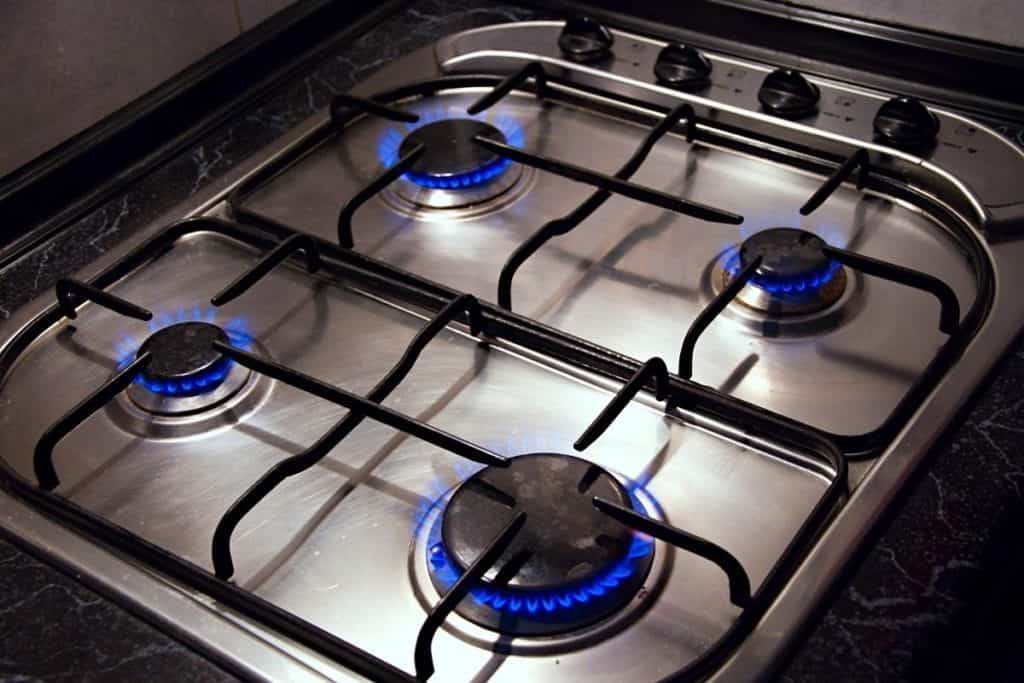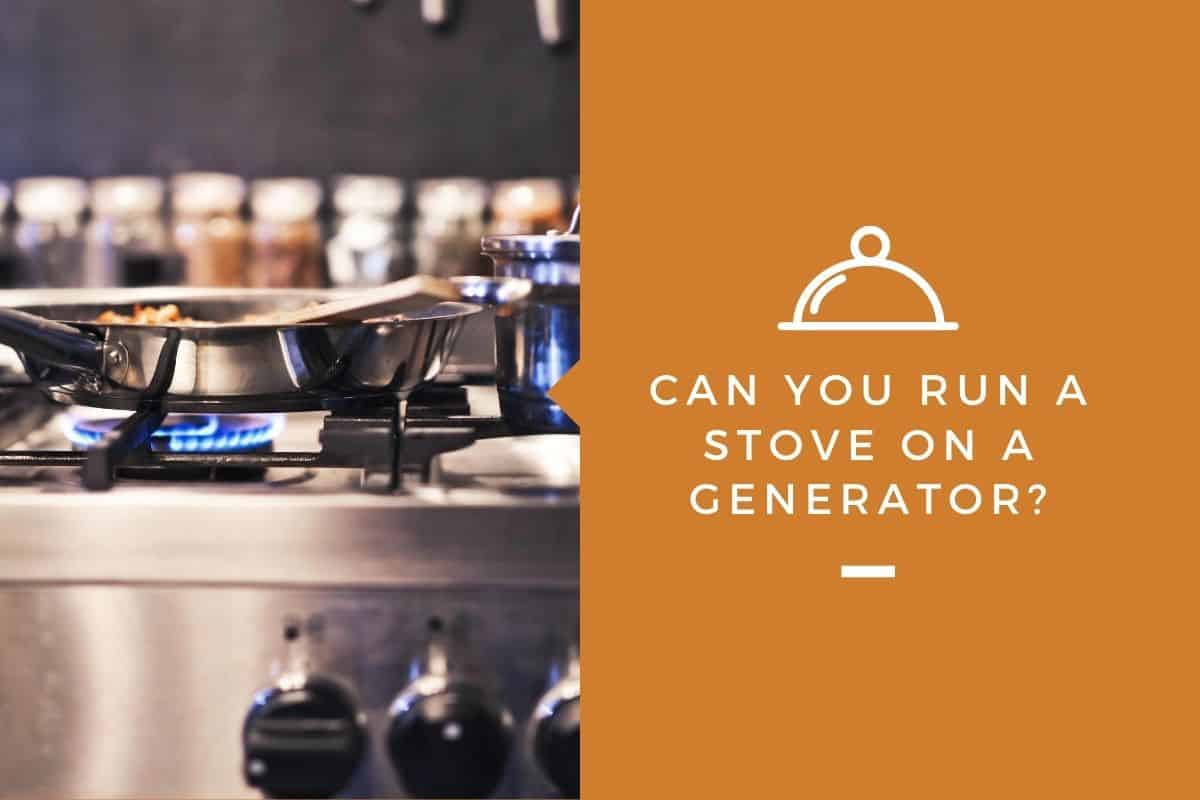There’s nothing more inconvenient than a power outage—and they always seem to happen at the most inopportune times or last longer than seems necessary. If you’re concerned about feeding your family during a power outage, you’re probably wondering if appliances like your stove can still be used to prepare non-perishable foods.
So, can you run a stove on a generator? When experiencing a power outage, you can operate your stove with a generator. But when it comes to choosing the right generator for your needs, there isn’t a one-size-fits-all generator—you’ll need to account for your specific stove and the watts required to power it.
Let’s take a look at what type of stove you have (to determine if a generator is the right solution for you!) and determine what size generator is needed to power your stove along with other essential appliances during a power outage.
How Does a Generator Power a Stove?
In the midst of a power outage, many homeowners rely on a generator to provide power to their homes. A generator can be used as a backup power source or as temporary power until power is restored to run appliances like your stove, refrigerator, water heater, and more.
To do this, a generator uses fuel such as gas or propane. When doing so, the generator produces an electric current by spinning a conducting coil within a magnetic field, resulting in an electric current in the coil.
This electric current is then passed through to the appliances to provide the power they need to operate efficiently. This allows you to cook meals on your stove no matter the circumstances taking place outside your front door.
Can a Generator Power My Stove?
Not all stoves are created equal—which means not all stoves are going to require a generator to operate during a power outage! So how do you know what type of stove you have and if a generator is the solution you’ve been looking for? Let’s find out.
Some of the most common stovetops are:
- Gas cooktops – Gas cooktops are one of the most common types of stoves across the country because of their ability to heat up food quickly with the powerful flames. One of the biggest benefits of a gas cooktop is that it does not require power to operate! During a power outage, you can get a gas cooktop to light by turning the knob to low and holding a match or a lighter to the burner. This will cause the flame to ignite and you’ll be able to use your stove to cook your food without the need for any power.
- Electric cooktops – As one of the easiest to clean stoves, electric cooktops are a sought after appliance for many homeowners. However, unlike a gas stove, an electric cooktop requires power to operate. This means that during a power outage, your stove will be inoperable without a power source like a generator available.
- Induction cooktops – An induction cooktop is a smooth surface that might look like a standard electric cooktop, but transfers heat through electromagnetism and leaves almost no trace of heat on the stove’s surface. Similar to an electric stove, an induction cooktop will need to have a reliable power source to operate during or in the aftermath of a storm. Luckily, an induction cooktop is easily powered with a generator that meets the required watts.
- Coil cooktops – Another form of an electric cooktop is a coil cooktop—they operate the same way but look completely different. While an electric stovetop has a smooth finish, a coil cooktop is made up of circular coils as the burners. To heat up these coils, electric currents are passed through them—currents that must be powered through electricity. That being said, a generator is a great option to power your coil stovetop during a power outage.
These are only a few of many types of stovetops on the market. If you don’t see yours listed above, you’ll want to guarantee a power source is required to operate it during a power outage before investing in a generator.
How Many Watts Does an Electric Stove Require?

The wattage needed to power a stove will vary depending on the make and model of the appliance. Most electric stoves will require 2,000 to 5,000 watts in order to operate at peak performance.
Your stove will likely fall somewhere within this range, with most stoves averaging around a 3,000 watts requirement. Keep in mind that all stoves are different—refer to your owner’s manual if you’re unsure where in the range your stove falls.
The burners on an electric stovetop will draw varying amounts of electricity because of their different sizes. The larger the burner, the more electricity is required to power it. Most electric stove cooktops will range from 1,200 watts to 3,000 watts depending on if you’re using a small burner or a large burner.
Understanding the watts required to power your stove will make it easier for you to determine the size generator required for your needs, which we go into more detail below.
What Size Generator Do I Need to Run a Stove?
There isn’t a one size fits all generator to power your stove. The size generator you need to successfully power your stove will depend on a multitude of factors. To determine what generator will be appropriately-sized for your specific needs, ask yourself these questions:
Apart from your stove, what appliances will the generator need to power?
If you’re only looking for a generator to run your oven and a few lights around the home, you can likely invest in a smaller sized generator. However, if you’re planning to power other large appliances along with the stove, such as the refrigerator, window air conditioner, water heater, and more, you will need to secure a much larger model that is built to provide sufficient power.
For what duration will the generator be in operation?
Are you purchasing a generator for a temporary solution when dealing with a minor power outage? Or are you looking for a more permanent solution to provide power for an extended period of time.
Depending on your needs are greater than running a single stove, you’ll need to take the tank size, fuel consumption, and similar factors into consideration. There’s nothing more frustrating than having a generator that isn’t equipped to handle the job it’s needed for! When in doubt, you’ll want to obtain a generator ready to provide more power than needed.
Will you need to power your entire home or only essential appliances like a stove?
Depending on where you live, the appliances you consider to be “essential” will vary. Along with your stove, you might consider powering your refrigerator and other appliances simultaneously.
Most of your essential appliances like a stove will be able to run on a generator rated at 5,000 to 7,000 watts. However, if you’re hoping to power your entire home as normal, a heavy-duty generator of 7,500 watts or more will be a much better investment. The more appliances you want to power, the larger your generator will need to be.
Your stove is just one of many “essential” appliances you’ll want to understand the required watts for. Adding up the total watts of all essential appliances will help you determine the right sized generator for your exact needs.
Figuring Out if You Need a Generator For Your Stove
By asking yourself these questions before heading to the home improvement store to pick up a generator, you will be able to make a fact-based decision to successfully power your stove and other home appliances.

